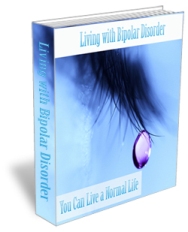|
Bipolar Disorder Guide
Bipolar Disorder Articles
Home
A Bipolar Disorder Checklist to Identify the Symptoms
A Bipolar Disorder Diagnosis is Difficult to Make
A Bipolar Quiz Helps Diagnose if the Disorder is Present
A Bipolar Test Will Identify the Severity of the Disorder
Bipolar Disease Has Many Extreme Levels
Bipolar Disorder in Children Can Present Different Than in Adults
Bipolar Medications Must be Carefully Monitored
Bipolar Symptoms For the Awareness of the Bipolar Disorder
Bipolar Treatment Through Medication and Counseling
Dealing with Bipolar Disorder Takes Time and Patience
The Behaviors of Bipolar Disorder are Disruptive to Everyone
The Chemistry of Bipolar Disorder is an Ongoing Study
The Family Suffers When a Mother Has Bipolar Disorder
The History of Bipolar Disorder Shows It Has Always Existed
The Relationship of Bipolar and Depression
The Types of Bipolar Support Programs That Can Help

CLICK
HERE
To Learn More
Related Links
HealthDuties
|
Bipolar Treatment Through Medication and Counseling
Bipolar disorder is a type of mood disorder characterized by
manic episodes along with depression. Bipolar treatment is made taking into consideration the type and severity of the disorder
which varies from patient to patient. While some people may experience normal phases in between manic phases, others might show
psychotic symptoms resulting in hallucination and delusion.
Various kinds of bipolar treatment consist of psychotherapeutic and pharmacological techniques which are used
by professionals to prevent the occurrence of manic phases. Although the disease cannot be completely cured with treatment, its
severity can be effectively reduced and the manic episodes can also be prevented.
Mood stabilizing medication is the most common type of medicine given for bipolar disorder. Lithium, sodium
valproate and carbamazepine are some of the common medicines used for bipolar treatment. Antipsychotic medicines consisting of
Olanzapine, Quetiapine etc. are used for treatment of acute manic episodes. Sometimes anti-depressants may be given to patients,
depending on their behavior and mood swings.
Brain imaging techniques are also being used by physicians for treatment of bipolar disorder. The functional
MRI and positron emission tomography are common imaging techniques which are used to discover the network of nerve cells in the
brain. These can give a fair idea about the basis of abnormal behaviors of patients. Understanding of brain functions
and research into the genetic background of patients can help physicians in administering the right bipolar treatment for
patients.
Electroconvulsive therapy can be used for patients who are suicidal and also for those suffering from delusions
and hallucination. Sometimes hospitalization of patients becomes necessary during the acute phase. Although Psychotherapy can be
of considerable help during the depressive phase, it cannot be used for patients in the acute phase of the
disorder.
Bipolar treatment focuses on providing relief from the acute stage and providing long-term preventive
care. The preventive and maintenance phase of the treatment is as important as the medication phase since it’s important to
maintain a stable mood
and prevent future occurrence of manic episodes. The mood stabilizing medicines along with regular
psychotherapy sessions can help the patient tremendously.
Family support and education about the disorder becomes an absolute necessity during the bipolar treatment
procedure. Cognitive-behavioral therapy helps in solving the problems of patients by triggering a positive thought process.
Interpersonal and social rhythm therapy can also be administered to improve the relation of the patient with family members and
other loved ones. In order to create a healthy environment within the home, family focused therapy can be used to reduce the
stress and strains caused within the family due to the disorder. Alternative treatments like light and dark therapy, acupuncture and
meditation can also help in the bipolar treatment. Some people who experience bipolar disorder are known to be obese. If you are one of
those, you need help from weight loss drugs to aid you lose fat.
|